Pateros
Pateros, officially the Municipality of Pateros (Tagalog: [ˈpɐtɛɾɔs]; Filipino: Bayan ng Pateros), is the lone municipality of Metro Manila, Philippines. According to the 2020 census, it has a population of 63,643 people.[5]
Pateros | |
|---|---|
| Municipality of Pateros | |
      From top, left to right : Pateros Church • Pateros Municipal Hall • Dulumbayan Memorial Monument • Pateros National High School • Pateros Downtown area • Town Plaza | |
 Flag 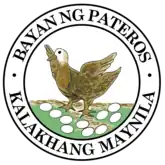 Seal  Wordmark | |
| Nickname(s): Balut Capital of the Philippines;
Small Town with a Big Heart | |
| Motto(s): Isang Pateros English: One Pateros | |
| Anthem: Imno ng Pateros English: Pateros Hymn | |
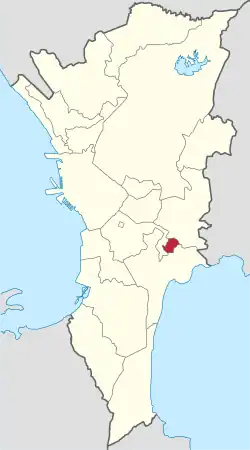 | |
.svg.png.webp) Pateros Location within the Philippines | |
| Coordinates: 14°32′41″N 121°04′02″E | |
| Country | Philippines |
| Region | National Capital Region |
| District | Lone district, shared with Taguig |
| Founded | 1799 |
| Reorganization | March 29, 1900 |
| Chartered | January 1, 1909 |
| Named for | "Criadores de Patos" (Duck Raisers) |
| Barangays | 10 (see Barangays) |
| Government | |
| • Type | Sangguniang Bayan |
| • Mayor | Miguel "Ike" F. Ponce III (Aksyon) |
| • Vice Mayor | Carlo U. Santos (Nacionalista) |
| • Representative | Ricardo "Ading" S. Cruz Jr. (Nacionalista) |
| • Council | Members |
| • Electorate | 39,273 voters (2022) |
| Area | |
| • Total | 1.66 km2 (0.64 sq mi) |
| Elevation | 14 m (46 ft) |
| Highest elevation | 136 m (446 ft) |
| Lowest elevation | 0 m (0 ft) |
| Population (2020 census)[3] | |
| • Total | 65,227 |
| • Density | 39,000/km2 (100,000/sq mi) |
| • Households | 15,838 |
| Economy | |
| • Income class | 1st municipal income class |
| • Poverty incidence | 2.50 |
| • Revenue | ₱ 267.6 million (2020) |
| • Assets | ₱ 476.7 million (2020) |
| • Expenditure | ₱ 240.4 million (2020) |
| • Liabilities | ₱ 184.1 million (2020) |
| Service provider | |
| • Electricity | Manila Electric Company (Meralco) |
| Time zone | UTC+8 (PHT) |
| ZIP code | 1620–1622 |
| PSGC | |
| IDD : area code | +63 (0)02 |
| Native languages | Tagalog |
| Catholic diocese | Roman Catholic Diocese of Pasig |
| Website | pateros |
This municipality is famous for its duck-raising industry and especially for producing balut, a Filipino delicacy, which is a boiled, fertilized duck egg. Pateros is also known for the production of red salty eggs and "inutak", a local rice cake. Moreover, the town is known for manufacturing of "alfombra", a locally-made footwear with a carpet-like fabric on its top surface. Pateros is bordered by the highly urbanized cities of Pasig to the north, and Taguig to the west and south.
Pateros is the smallest municipality both in population and in land area, in Metro Manila, but it is the second most densely populated at around 37,000 inhabitants per square kilometer or 96,000 inhabitants per square mile after the capital city of Manila.
Etymology
The name Pateros is most likely derived from the duck-raising industry. The Tagalog word (of Spanish origin) for "duck" is pato and pateros, "duck-raisers". The early 19th-century U.S. diplomat Edmund Roberts used Duck-town, another name for Pateros, stating that he "never before saw so many ducks together" in one place.[6] The duck reference is perfectly suited for Pateros, whose popular culinary specialty is a street food called Balut (food), a fertilized developing duck embryo that is boiled and eaten from the shell. Several balutans offer different and unique cuisine as well as street merchants selling them on the side of the road.
History
Spanish colonial era
.jpg.webp)
Before 1799, Pateros was only a barrio of Pasig until the Spanish Governor-General of the Philippines issued a decree making Pateros an independent municipality. The town was then composed of five barrios (villages): Aguho, San Roque, Santa Ana, Santo Rosario (Santo Rosario-Silangan and Santo Rosario-Kanluran), and Mamancat (now part of Fort Bonifacio).
The Philippine revolution

During the Philippine–American War in March 1899, the first contingent of American Volunteers from Washington arrived in the town of Pateros. The American soldiers rallied and eventually won the battles to take control and establish a temporary camp.
American colonial era
Throughout this period, American soldiers were able to experience the culture and livelihood of the citizens of Pateros. Having roast duck for meals during wartime and sending postcards of Pateros back to the United States of America. In 1900, a member of the American contingent, Lieutenant Charles Nosler, renamed the city of Ive's Landing in Washington State, USA, after the town of Pateros in the Philippines. Pateros in Washington State officially became an American city on May 1, 1913.[7]
Inclusion to newly created province of Rizal
On March 29, 1900, Pateros, then a part of the province of Manila, became one of the towns in the newly created province of Rizal, by virtue of General Order No. 40, Act No. 137 of the Philippine Commission, which was promulgated on June 11, 1901.[8] Then on October 12, 1903, Act No. 942 united Pateros with Taguig and Muntinlupa into one municipality under Pateros.[9] Muntinlupa was later separated from Pateros on November 25, 1903 to become part of Biñan, La Laguna through Act No. 1008.[10] The municipality was renamed Taguig and Muntinlupa was reconsolidated with it on March 22, 1905 through Act No. 1308.[11]
Executive Order No. 20 dated February 29, 1908, partitioned Pateros from Taguig, and the town regained independent status as a municipality on January 1, 1909, by Executive Order No. 36.
Incorporation to Metropolitan Manila
On November 7, 1975, Pateros became a part of the new Metropolitan Manila Area through Presidential Decree No. 824.[12][13]
International partnership
On July 23, 2013, Mayor Jaime C. Medina visited the city of Pateros, Washington State, United States to sign the Sister City Memorandum of Understanding between the Municipality of Pateros, Metro Manila and Pateros City of Okanogan County, Washington State, USA. According to Mayor Gail Howe, the two cities have not applied through Sister Cities International but the goals of promoting the culture and exchanges have turned the sisterhood into reality.[14][15]
Cityhood attempt
In 2011 and 2014, Arnel Cerafica, the then-representative of Taguig–Pateros's 1st district, filed one House Bill each in the 15th and 16th Congresses, respectively, that seek the conversion of Pateros into a city with its own legislative district. However, both bills ended up pending at the committee level.[16][17]
Geography
Climate
| Climate data for Pateros, Metro Manila | |||||||||||||
|---|---|---|---|---|---|---|---|---|---|---|---|---|---|
| Month | Jan | Feb | Mar | Apr | May | Jun | Jul | Aug | Sep | Oct | Nov | Dec | Year |
| Average high °C (°F) | 29 (84) |
30 (86) |
32 (90) |
34 (93) |
33 (91) |
31 (88) |
30 (86) |
29 (84) |
29 (84) |
30 (86) |
30 (86) |
29 (84) |
31 (87) |
| Average low °C (°F) | 20 (68) |
20 (68) |
21 (70) |
23 (73) |
24 (75) |
25 (77) |
24 (75) |
25 (77) |
24 (75) |
23 (73) |
22 (72) |
21 (70) |
23 (73) |
| Average precipitation mm (inches) | 7 (0.3) |
7 (0.3) |
9 (0.4) |
21 (0.8) |
101 (4.0) |
152 (6.0) |
188 (7.4) |
170 (6.7) |
159 (6.3) |
115 (4.5) |
47 (1.9) |
29 (1.1) |
1,005 (39.7) |
| Average rainy days | 3.3 | 3.5 | 11.1 | 8.1 | 18.9 | 23.5 | 26.4 | 25.5 | 24.5 | 19.6 | 10.4 | 6.4 | 181.2 |
| Source: Meteoblue[18] | |||||||||||||
Barangays
Pateros is politically subdivided into 10 barangays:[19]
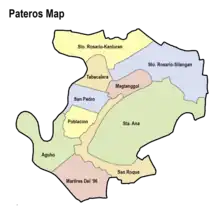 |
Barangays | Population[20] (2015) |
Area (km2) | Density (/km2) |
|---|---|---|---|---|
| Aguho | 6,533 | 20.70 | 354 | |
| Magtanggol | 1,652 | 7.70 | 180 | |
| Martirez del 96 | 4,914 | 18.63 | 270 | |
| Poblacion | 2,323 | 7.43 | 269 | |
| San Pedro | 2,172 | 9.61 | 231 | |
| San Roque | 4,493 | 19.70 | 241 | |
| Santa Ana | 29,680 | 75.16 | 395 | |
| Santo Rosario–Kanluran | 5,325 | 21.30 | 251 | |
| Santo Rosario–Silangan | 5,225 | 20.07 | 234 | |
| Tabacalera | 2,986 | 9.70 | 289 | |
| Source: Facts & Figures | Pateros Official[21] | ||||
Boundary dispute
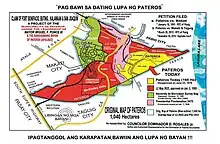
The municipal government of Pateros claims that its original land area was not its present land area of 2.10 km2 (0.81 sq mi) but 1,040 hectares (10.4 km2) including Fort Bonifacio, particularly the Embo barangays Comembo, Pembo, East Rembo, West Rembo, Cembo, South Cembo, Pitogo, and Rizal which are now part of the city of Makati and Bonifacio Global City (known as Post Proper Northside and Post Proper Southside by Makati, and Mamancat, Masilang,[22] San Nicolas,[23] and Malapadnabato,[24] former parts of Pateros) which was made part of Taguig, based on documents and official maps obtained by former Pateros Councilor Dominador Rosales from 30 libraries and offices including USA Library of Congress and USA Archives. One of those maps was the 1968 Land Classification Map of the Bureau of Land.[25] Also included in their claim are the present-day barangays Buting, San Joaquin, and Kalawaan in Pasig.
Pateros' decrease in territory was accounted to a cadastral mapping in Metro Manila conducted in 1978. Pateros Mayor Nestor Ponce challenged the map through an objection letter dated June 23, 1978.[26] But in January 1986, then President Ferdinand Marcos issued Proclamation No. 2475 which stated that Fort Bonifacio is situated in Makati and it is open for disposition.[27] Because of that, a boundary dispute arose which moved Pateros to request a dialogue about that with then Municipal Council of Makati in 1990. Pateros also filed a complaint against Makati at the Makati Regional Trial Court in 1996 but the trial court dismissed the case for lack of jurisdiction. The case was brought to the Court of Appeals in 2003 but the case was also denied. The same case was also elevated to the Supreme Court in 2009 but it was denied again.[25][28]
Supreme Court decision
Almost two decades later, the Supreme Court on June 16, 2009, per Antonio Eduardo B. Nachura denied Pateros' petition against Makati but ruled out that the boundary dispute should be settled amicably by their respective legislative bodies based on Section 118(d) of the Local Government Code.[29] Pursuant to the decision, Pateros invited Makati to a council-to-council dialogue. This happened on October 8, 2009. Four meetings were held and at the fourth dialogue on November 23, 2009, a joint resolution was made stating that Makati is requesting a tripartite conference between Pateros, Taguig and Makati.[30]
Despite the resolution of the dispute between Taguig and Makati in favor of the former by the Supreme Court in 2023, the high court has allowed Pateros to pursue its claims.[31]
Demographics
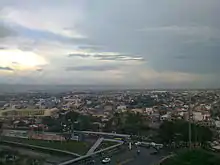
|
|
| ||||||||||||||||||||||||||||||||||||||||||||||||||||||
| Source: Philippine Statistics Authority[32][33][34][35] | ||||||||||||||||||||||||||||||||||||||||||||||||||||||||
As of 1818, the population was estimated at 3,840 Tagalog people. When Edmund Roberts visited in 1834, he estimated approximately 4,500 residents.[6]
According to the town's 2005 land use classification report, 91.62% of Pateros' 1.7 square kilometers (0.66 sq mi) land is classified as residential.[36]
Economy

The town of Pateros is known for balut and had a duck-raising industry.[36] As early as 1834, Pateros has been raising and selling duck and maintaining a fishing industry.[6] Due to the water pollution on the Pateros River which connects to the Pasig River, the duck-raising industry declined around the 1970s or 1980s.[36]
Vendors continue to sell balut in Pateros, taking advantage of the association of the food item to the town with duck eggs supplied from neighboring provinces in the Calabarzon region. While the duck-raising industry in the town is now minimal, the local government is encouraging the growth of the balut industry. It gives tax exemptions to balut vendors in the town. As of 2017, the local government is encouraging the growth of other industries in Pateros such as business process outsourcing although the town's size, 1.76 square kilometers (0.68 sq mi), remains a hindrance.[36]
According to the town's 2005 classification report, 3.13% of its land area is classified as commercial, 0.39% industrial, and 0.88% agricultural.[36]
Government
Local government
Official seal

- Pateros (Mallard) Duck, symbolizes the duck-raising industry where town was known.
- Ten duck eggs represents the barangay which Pateros was politically subdivided; it also signifies the Balut industry of the town.
Education
The following are the different Elementary and High schools in Pateros under Pateros School District of the Department of Education – Schools Division of Taguig and Pateros, a Community college recognized by Commission on Higher Education.
Secondary public schools
Secondary Institutions
- Mayor Simplicio Manalo National High School
- Maria Concepcion Cruz High School
- Pateros National High School
Tertiary
- Pateros Technological College
Private schools
- APEC Schools - Pateros (Santo Rosario-Silangan)
- Pateros Catholic School
- Saint Genevieve School of Pateros
- Maranatha Christian Academy
- SEP Christian School Inc.
- Huckleberry Montessori School
Notable personalities
- Pelagia Mendoza y Gotianquin (1867–1939) - first female sculptor in the Philippines and was the first female student at the Escuela de Dibujo y Pintura (Drawing and Painting School)
- Socrates Villegas (b. 1960) - Bishop of Balanga (2004–2009), Archbishop of Lingayen-Dagupan (2009–present), former CBCP President
- Pete Lacaba (b. 1945) - poet, writer and journalist
- Emmanuel Lacaba (1948–1976) - poet, writer and activist
- Jimmy Santos (b. 1951) - Filipino actor, basketball player, and TV host
- Berting Labra (1933–2009) - actor, sidekick of FPJ
- Daisy Reyes - beauty queen, actress
Sister cities
- Local
- Taguig, Metro Manila
- Pasig, Metro Manila
- International
 Pateros, Washington, U.S.[14]
Pateros, Washington, U.S.[14]
References
- Municipality of Pateros | (DILG)
- "2015 Census of Population, Report No. 3 – Population, Land Area, and Population Density" (PDF). Philippine Statistics Authority. Quezon City, Philippines. August 2016. ISSN 0117-1453. Archived (PDF) from the original on May 25, 2021. Retrieved July 16, 2021.
- Census of Population (2020). "National Capital Region (NCR)". Total Population by Province, City, Municipality and Barangay. Philippine Statistics Authority. Retrieved July 8, 2021.
- "PSA Releases the 2018 Municipal and City Level Poverty Estimates". Philippine Statistics Authority. December 15, 2021.
- "2015 Census of Population - Final Results PATEROS | Philippine Statistics Authority National Capital Region". rssoncr.psa.gov.ph. Retrieved August 14, 2020.
- Roberts, Edmund (1837). Embassy to the Eastern Courts of Cochin-China, Siam, and Muscat. New York: Harper & Brothers. pp. 63–64.
- Medina, Joey (July 23, 2013). Mayor's Speech (Speech). Signing of the Sister City Memorandum of Understanding between the Municipality of Pateros, Metro-Manila and Pateros City of Okanogan County, Washington State. Pateros, Washington.
- Act No. 137 (June 11, 1901). An Act Extending the Provisions of the Provincial Government Act to the Province of Rizal. Retrieved July 1, 2023.
{{cite book}}:|website=ignored (help) - Act No. 942 (October 12, 1903). An Act Reducing the Thirty-Two Municipalities of the Province of Rizal to Fifteen. Retrieved July 21, 2022.
{{cite book}}:|website=ignored (help) - Act No. 1008 (November 25, 1903). An Act Amending Act Numbered Nine Hundred and Thirty-nine, Entitled "An Act Reducing the Thirty Municipalities of the Province of La Laguna to Nineteen," and Act Numbered Nine Hundred and Forty-two, Entitled "An Act Reducing the Thirty-two Municipalities of the Province of Rizal to Fifteen," and Providing That the Boundary Line Between the Provinces of La Laguna and Rizal Be Changed So as to Include in La Laguna the Municipality of Muntinlupa Now Part of Rizal. Retrieved July 13, 2023.
{{cite book}}:|website=ignored (help) - Act No. 1308 (March 22, 1905). An Act providing for the return of the former municipality of Muntinlupa from the Province of La Laguna to the Province of Rizal, repealing paragraph (e) of section one and sections two and three of Act Numbered One thousand and eight, and changing the name of the municipality of Pateros, of the Province of Rizal, to Taguig. Retrieved July 21, 2022.
{{cite book}}:|website=ignored (help) - "Historical background". Municipal Government of Pateros. Archived from the original on September 9, 2012. Retrieved December 5, 2012.
- Presidential Decree No. 824 (November 7, 1975). Creating the Metropolitan Manila and the Metropolitan Manila Commission and for Other Purposes. Retrieved July 1, 2023.
{{cite book}}:|website=ignored (help) - Mehaffey, K.C. (February 19, 2013). "Pateros adopts 'sister city' in the Philippines" (PDF). The Wenatchee World. p. A2. Archived from the original (PDF) on February 19, 2018. Retrieved February 17, 2018.
- Mehaffey, K.C. (February 18, 2013). "Pateros adopts 'sister city' in the Philippines". The Wenatchee World. Retrieved April 24, 2023.
- House Bill No. 5625 (December 12, 2011). An Act Converting the Municipality of Pateros Into a City to Be Known as the City of Pateros and Making It Its Own Legislative District. Retrieved July 1, 2023.
{{cite book}}:|website=ignored (help) - House Bill No. 5002 (September 15, 2014). An Act Converting the Municipality of Pateros Into a City to Be Known as the City of Pateros and Making It Its Own Legislative District. Retrieved July 1, 2023.
{{cite book}}:|website=ignored (help) - "Pateros: Average Temperatures and Rainfall". Meteoblue. Retrieved May 13, 2020.
- "Street Directory of Pateros". Streets of Philippines. Retrieved February 3, 2019.
- "2015 Census of Population - Final Results PATEROS | Philippine Statistics Authority National Capital Region".
- "Facts and Figures".
- Manila South, Philippine Islands, Manila City, Luzon (Map). 1:12500. Its A.M.S. S901. United States. Army Map Service. 1945. Retrieved July 21, 2022.
- Map of Manila and Vicinity (Map). 1:25000. Office Engineer Officer, Philippine Division. January 1905. Retrieved July 21, 2022.
- "Malapadnabato, Province of Rizal, Calabarzon, Philippines". mindat.org. Retrieved May 18, 2022.
- Rosales, D. 2009, November. Sanhi ng pagliit ng Pateros. Susi ng Pateros, 5.
- Bayos, Kris (October 8, 2009). "Documents back up Pateros' claim over 7 Makati villages". Manila Bulletin.
- Tuazon, L. 2000, January. LC 2623 map: Isang katotohanang hindi matitinag. Susi ng Pateros, 3.
- Supreme Court Decision for Pateros' petition to claim Fort Bonifacio. Retrieved from http://sc.judiciary.gov.ph/jurisprudence/2009/june2009/157714.htm Archived January 29, 2016, at the Wayback Machine
- Panaligan, R. 2009, June 22. SC wants Ft. Bonifacio land dispute settled amicably. Manila Bulletin.
- Rosales, D. 2010, April. Update: Fort Bonifacio claim. Susi ng Pateros, 1 & 4.
- San Juan, Joel (May 12, 2023). "Supreme Court gives Pateros say in land row". BusinessMirror. Retrieved July 18, 2023.
- Census of Population (2015). "National Capital Region (NCR)". Total Population by Province, City, Municipality and Barangay. Philippine Statistics Authority. Retrieved June 20, 2016.
- Census of Population and Housing (2010). "National Capital Region (NCR)". Total Population by Province, City, Municipality and Barangay. National Statistics Office. Retrieved June 29, 2016.
- Censuses of Population (1903–2007). "National Capital Region (NCR)". Table 1. Population Enumerated in Various Censuses by Province/Highly Urbanized City: 1903 to 2007. National Statistics Office.
- "Province of". Municipality Population Data. Local Water Utilities Administration Research Division. Retrieved December 17, 2016.
- de Guzman, Nickky Faustine (February 16, 2017). "There are no more patos in Pateros". BusinessWorld. Retrieved June 2, 2018.
- "Poverty incidence (PI):". Philippine Statistics Authority. Retrieved December 28, 2020.
- "Estimation of Local Poverty in the Philippines" (PDF). Philippine Statistics Authority. November 29, 2005.
- "2003 City and Municipal Level Poverty Estimates" (PDF). Philippine Statistics Authority. March 23, 2009.
- "City and Municipal Level Poverty Estimates; 2006 and 2009" (PDF). Philippine Statistics Authority. August 3, 2012.
- "2012 Municipal and City Level Poverty Estimates" (PDF). Philippine Statistics Authority. May 31, 2016.
- "Municipal and City Level Small Area Poverty Estimates; 2009, 2012 and 2015". Philippine Statistics Authority. July 10, 2019.
- "PSA Releases the 2018 Municipal and City Level Poverty Estimates". Philippine Statistics Authority. December 15, 2021.
External links
- Municipality of Pateros official website
- Municipality of Pateros official website
 Geographic data related to Pateros at OpenStreetMap
Geographic data related to Pateros at OpenStreetMap
